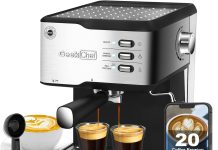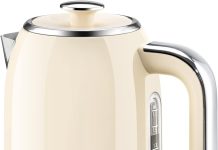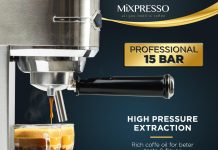Have you ever been disappointed by a weak or watery cup of coffee from your trusty coffee machine? It can be a frustrating experience, especially when you’re in need of that much-needed pick-me-up in the morning. But fear not, as we’re here to uncover the secrets behind what causes this underwhelming brew. Join us as we explore the various factors that can contribute to weak or watery coffee from a coffee machine, and learn how you can achieve that perfect, robust cup of joe every time. Get ready to elevate your coffee game and say goodbye to lackluster mornings!
Review contents
Coffee Beans
Grind Size
One of the main factors that can affect the strength and flavor of your coffee is the grind size of your coffee beans. The grind size determines how quickly the water can extract the flavors and aromas from the coffee grounds. If the grind size is too coarse, the water will pass through the grounds too quickly, resulting in weak and watery coffee. On the other hand, if the grind size is too fine, the water may struggle to flow through the densely packed grounds, leading to over-extraction and a bitter taste.
Coffee-to-Water Ratio
Getting the right coffee-to-water ratio is essential for achieving a balanced and flavorful cup of coffee. If you use too little coffee in proportion to the amount of water, the resulting brew will be weak and dilute. On the contrary, using too much coffee can lead to an overpowering and bitter flavor. Finding the perfect coffee-to-water ratio depends on personal taste preferences and the desired strength of the coffee. Experimenting with different ratios can help in determining the ideal combination for a satisfying brew.
Coffee Roast Level
The roast level of your coffee beans can also impact the strength and taste of your coffee. Lighter roasts tend to have a brighter and more acidic flavor profile, while darker roasts are known for their bold and robust taste. If you prefer a stronger cup of coffee, opting for a darker roast might be the way to go. However, it’s important to note that darker roasts can also result in more bitterness. Finding the roast level that suits your palate can help in avoiding weak or watery coffee.
Water Quality
Tap Water
The quality of the water you use can greatly impact the taste of your coffee. Tap water, while convenient, may contain impurities and additives that affect the flavor and quality of your brew. Chlorine, for example, can give the coffee a chemical taste. If your tap water has a strong odor or taste, it is advisable to consider using filtered or bottled water for a cleaner and more enjoyable cup of coffee.
Mineral Content
The mineral content of the water can also influence the extraction process and the final flavor of your coffee. Water that is too hard (high mineral content) can make it difficult for the coffee to fully extract its flavors, resulting in weak and underwhelming coffee. On the other hand, water with extremely low mineral content can lead to over-extraction, resulting in a bitter and unbalanced taste. Finding the right balance of minerals in the water can help in achieving a well-extracted and flavorful cup of coffee.
Water Temperature
The temperature of the water used for brewing plays a crucial role in the extraction of flavors from the coffee grounds. If the water is too hot, it can cause over-extraction, resulting in a bitter taste. Conversely, if the water is too cool, the extraction may be insufficient, leading to weak and underwhelming coffee. The ideal water temperature for brewing coffee is usually between 195°F and 205°F (90°C to 96°C). Ensuring that the water temperature is within this range can help in achieving a well-balanced and flavorful cup of coffee.
Coffee Machine
Coffee Machine Quality
The quality of your coffee machine can significantly impact the strength and quality of your coffee. A high-quality machine with precise temperature control and brewing capabilities can extract the flavors from the coffee beans more effectively, resulting in a rich and robust brew. On the other hand, using a lower-quality machine may not provide consistent heat or brewing conditions, leading to weak and watery coffee. Investing in a reliable and well-built coffee machine can make a noticeable difference in the final cup of coffee.
Coffee Machine Cleanliness
Regular cleaning and maintenance of your coffee machine are essential for ensuring optimal brewing conditions and maintaining the flavor of your coffee. Coffee residue and oils can build up over time, affecting the taste and quality of your brew. If your machine is not cleaned regularly, these residues can accumulate and clog the brewing system, causing water to pass through too quickly, resulting in weak and under-extracted coffee. Maintaining a clean coffee machine can help in preventing these issues and ensuring a consistently delicious cup of coffee.
Coffee Machine Calibration
Ensuring that your coffee machine is properly calibrated is another essential factor in achieving a strong and flavorful brew. Calibration includes adjusting the grind size, water temperature, and extraction time to suit your specific preferences. If the calibration is incorrect, it can lead to weak and watery coffee. Taking the time to understand and experiment with the settings on your coffee machine can help in finding the perfect balance for a satisfying cup of coffee.
Brewing Process
Extraction Time
The duration of the extraction process, also known as the brew time, can significantly impact the strength and flavor of your coffee. If the extraction time is too short, the water may not have enough contact with the coffee grounds to extract the desired flavors, resulting in weak and watery coffee. On the other hand, if the extraction time is too long, it can lead to over-extraction, resulting in a bitter and unpleasant taste. Finding the optimal extraction time for your preferred taste can help in achieving a well-balanced and flavorful cup of coffee.
Brewing Technique
The way you brew your coffee can also affect its strength and flavor. Different brewing methods, such as French press, pour-over, or espresso, require varying techniques and equipment. Each method has its own recommended ratios, grind sizes, and brewing times. Experimenting with different brewing techniques can help in finding the method that suits your taste preferences and allows you to achieve a strong, flavorful cup of coffee.
Correct Water Dispersion
Properly dispersing the water over the coffee grounds during the brewing process is crucial for a well-extracted and balanced cup of coffee. Uneven water dispersion can result in areas of over-extraction and under-extraction, leading to an uneven and weak brew. Ensuring that the water is evenly distributed over the coffee bed helps in extracting the flavors more uniformly and consistently, resulting in a stronger and more flavorful cup of coffee.
Grind Consistency
Blade Grinder
Using a blade grinder to grind your coffee beans can result in uneven grind sizes, which can lead to weak and watery coffee. Blade grinders chop the coffee beans into various particle sizes, resulting in a mixture of fine and coarse grounds. This inconsistency can affect the extraction process, with finer grounds over-extracting and coarser grounds under-extracting. Investing in a burr grinder, which provides more consistent and uniform grind sizes, can greatly improve the quality and strength of your coffee.
Cheap Burr Grinder
While a burr grinder generally provides a more consistent grind size, using a cheaper or lower-quality burr grinder may still result in inconsistency, affecting the flavor and strength of your coffee. Inconsistent particle sizes can lead to uneven extraction, resulting in weak and underwhelming coffee. Investing in a high-quality burr grinder can make a significant difference in the grind consistency, allowing for a more uniform extraction and a stronger cup of coffee.
Inconsistent Particle Size
Grinding your coffee beans to a consistent particle size is essential for achieving a balanced and flavorful brew. Inconsistent particle sizes can lead to uneven extraction, with some particles under-extracted and others over-extracted. This inconsistency can result in a weak and watery cup of coffee. Choosing a grinder that provides consistent grind sizes, as well as regularly calibrating and adjusting the grinder settings, can help in achieving a more even extraction and a stronger coffee flavor.
Storage and Freshness
Coffee Bean Storage
Properly storing your coffee beans is crucial for maintaining their freshness and flavor. Exposure to air, light, heat, and moisture can all degrade the quality of the beans and result in weak and stale-tasting coffee. It is recommended to store your coffee beans in an airtight container away from direct sunlight, heat sources, and areas with high humidity. Additionally, buying whole beans and grinding them just before brewing can help in preserving the flavors and aromas for a stronger and more flavorful cup of coffee.
Pre-ground Coffee
While convenient, using pre-ground coffee can often result in weaker and less flavorful coffee compared to freshly ground beans. Pre-ground coffee tends to lose its flavors and aromas more quickly as it is exposed to air. Furthermore, the grind size may not be suitable for your specific brewing method, leading to inconsistent extraction and a weaker brew. Investing in a good quality grinder and grinding your coffee beans just before brewing can help in achieving a fresher, stronger, and more flavorful cup of coffee.
Coffee Age
Coffee beans, like any other food product, have a limited shelf life. The freshness of the beans can greatly impact the taste and strength of your coffee. As coffee beans age, they gradually lose their flavors and aromas, resulting in a weaker and less vibrant brew. It is recommended to consume coffee beans within a few weeks of their roast date for the best flavor. Additionally, buying coffee from reputable roasters who provide the roast date on the packaging can help in ensuring that you’re using fresh beans and avoiding weak or watery coffee.
Dilution
Adding Too Much Water
Adding excessive amounts of water to your coffee can easily result in a weak and watery brew. While it may seem tempting to dilute a strong cup of coffee, doing so can dilute the flavors and make the coffee taste thin. It is important to find the balance between concentration and volume that suits your taste preferences and desired strength of the coffee.
Adding Ice
If you prefer your coffee iced, adding ice to a freshly brewed hot coffee can quickly dilute the flavors and result in a weaker taste. The melting ice will significantly increase the volume of the coffee while decreasing its strength. To avoid weak and watery iced coffee, one alternative is to cold brew the coffee by steeping coffee grounds in cold water for an extended time. This method allows for a stronger and more flavorful iced coffee without the need for additional ice dilution.
Pre-infusion
For certain brewing methods, such as espresso, pre-infusion is an important step that helps in achieving a well-extracted and strong cup of coffee. Pre-infusion involves saturating the coffee grounds with a small amount of water before the full extraction begins. This allows the coffee to bloom and release trapped gases, ensuring a more even and thorough extraction. Skipping the pre-infusion step or using insufficient pre-infusion time can result in weak and under-extracted coffee.
Filter
Paper Filter Thickness
The thickness of the paper filter used in your brewing method can affect the brew strength and overall flavor of your coffee. Thicker filters tend to retain more oils and fine particles, resulting in a cleaner and lighter cup of coffee. On the other hand, thinner filters allow more oils and sediment to pass through, resulting in a bolder and potentially stronger brew. Experimenting with different filter thicknesses can help in finding the perfect balance between flavor and strength according to your taste preferences.
Filter Basket Design
The design of the filter basket, particularly in espresso machines, can significantly impact the extraction process and the strength of the coffee. A well-designed filter basket ensures even water distribution and optimal contact with the coffee grounds. If the filter basket is poorly designed or has uneven holes, it can lead to inconsistent extraction, resulting in weak or over-extracted coffee. Choosing a high-quality espresso machine with a well-engineered filter basket can help in achieving a stronger and more balanced cup of espresso.
Filter Clogging
A clogged filter can hinder the water flow and impede the extraction process, leading to weak and under-extracted coffee. Oils and fine particles from the coffee grounds can accumulate in the filter over time, causing it to become clogged. Regularly cleaning and replacing the filter can help in preventing clogging and ensuring an unobstructed flow of water for a stronger and better-extracted cup of coffee.
Machine Maintenance
Infrequent Cleaning
Neglecting regular cleaning and maintenance of your coffee machine can lead to a buildup of coffee oils and residues, negatively impacting the taste and strength of your coffee. Over time, these residues can accumulate and clog the brewing system, impeding the extraction process and resulting in weak and under-extracted coffee. Regularly cleaning the machine, including the brew group, group head, and portafilter, helps in removing these residues and ensuring optimal brewing conditions for a stronger cup of coffee.
Buildup of Coffee Oils
Coffee oils can build up on various parts of the coffee machine, such as the brew group, shower screen, and portafilter. This buildup can affect the taste and strength of the coffee by interfering with the extraction process. Additionally, coffee oils can turn rancid over time, resulting in off-flavors and a weaker brew. Regularly cleaning and removing coffee oils from the machine can help in maintaining the optimal flavor and strength of your coffee over time.
Malfunctioning Parts
If certain parts of your coffee machine, such as the water pump or heating element, are not functioning properly, it can affect the brewing process and result in weak and watery coffee. Malfunctioning parts may not provide consistent water flow or brewing temperatures, leading to an unsuccessful extraction. Regularly checking and ensuring that all parts of your coffee machine are in good working condition can help in avoiding potential issues and maintaining the strength and quality of your coffee.
Other Factors
Altitude
Altitude can affect the brewing process and the extraction of flavors from the coffee grounds. At higher altitudes, where the air pressure is lower, water boils at a lower temperature. This can result in under-extracted coffee, as the water may not reach the optimal brewing temperature. Adjusting the brewing parameters, such as using slightly hotter water or extending the brewing time, can help in compensating for the lower boiling point and achieving a stronger cup of coffee at higher altitudes.
Air Pressure
Air pressure, particularly in espresso machines, plays a crucial role in the extraction process. The proper pressure allows for the optimal extraction of flavors from the coffee grounds. If the air pressure is too low or inconsistent due to a malfunctioning machine or worn-out components, it can lead to weak and under-extracted coffee. Regularly maintaining and checking the air pressure in your espresso machine can ensure a consistent and strong cup of espresso.
Humidity
Humidity can affect the brewing process by altering the moisture content of the coffee grounds. High humidity can make the coffee beans absorb more moisture from the air, resulting in denser grounds and potentially affecting the extraction process. On the other hand, low humidity can cause the beans to dry out, resulting in lighter and more porous grounds. Finding the optimal brewing parameters for your specific humidity conditions can help in achieving a strong and consistent cup of coffee.
In conclusion, weak or watery coffee from a coffee machine can be caused by various factors, including the grind size of the coffee beans, the coffee-to-water ratio, the coffee roast level, the quality and cleanliness of the coffee machine, the brewing process, the consistency of the grind, the storage and freshness of the coffee beans, dilution factors, the filter used, proper machine maintenance, and other external factors such as altitude, air pressure, and humidity. By considering and adjusting these factors, you can improve the strength and flavor of your coffee, ensuring a more satisfying and enjoyable brewing experience.











































